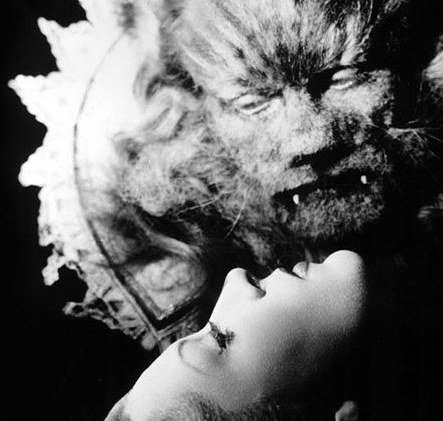Alicia Fletcher is a media archivist and film programmer dedicated to promoting and advocating for moving image preservation. Her expertise in early cinema makes her the ideal curator and host of Silent Revue, Toronto’s on-going examination of silent film held at the historic Revue Cinema.
She is also the curator of the Ladies of Burlesque program at The Royal Cinema. And top it all off, she teaches a seminar in the History of Film at Ryerson University.
In the middle of a hectic schedule, Fletcher took time to answer a few of my questions about her influences and these two successful programs at two of Toronto’s repertory cinemas.
HM: What are your earliest memories about film and how did these evolve into a career in preserving and archiving?
Alicia Fletcher (AF): My mother religiously tuned into TVO’s Saturday Night at the Movies, which was hosted by Elwy Yost, and some of my first memories of “classic” films revolve around his introductions and segments, so it was a matter of osmosis. It’s not without embarrassment that I admit feeling put off and cranky when a black and white film was aired (I would pitch a little fit apparently). Somewhere along the line, I developed an obsession with anything Technicolor. I used to fast forward through the sepia portions of The Wizard of Oz – these confessions may get me excommunicated from the classic cinephile community.
Luckily, I’ve fully recovered from this early aversion, and dream in black-and-white as much as I do in Technicolor. My career in preservation and archiving grew out of an interest in silent film history. Learning that 90% of silent film is considered lost led me down a path to proactively protect what remains—both as an object (a film reel that sits on a shelf in a vault or otherwise), as well as an understanding of the silent era’s context. The natural extension of that is programming.

HM: You have degrees in Photographic Preservation and Collections Management, and also in Cinema Studies — clearly you are knowledgeable and passionate about the medium. When did the idea to start a program (Silent Revue) celebrating silent films begin?
AF: I wish that I could say it was my idea—but it wasn’t. After specializing in the history and preservation of silent film I began to attend and occasionally introduce screenings at the Revue’s signature film series – then called Silent Sundays. Programmer Eric Veillette founded it in 2009 and after volunteering for about a year, I took over as lead programmer in 2013, wherein the series’ name changed to Silent Revue.
Film preservation informs every element of the series—I often show archival prints or occasionally give talks on the preservation of film and its ephemera from this particular era. While studying at the Eastman Museum in Rochester, NY, which houses the world’s preeminent collection of silent film, I fully embraced my almost compulsive desire to know everything about the era. With access to that world-renowned collection and in the company of knowledgeable experts I gained a one-of-a-kind schooling in the art of the silent film.
HM: Toronto boasts a great cinephile community. We can be picky about film-related events we attend, yet Silent Revue is very successful. How important is it for you to keep the audience in mind when you curate a program?
AF: If I didn’t have the audience in mind with everything I program, Silent Revue would end [up] being quite obscure and bizarre. The series’ success is indebted to balancing the silent “blockbusters” (the Keatons, the Chaplins, WINGS, etc.) with the more underground films (take something like PICCADILLY, for instance). You build a following with the former and trust with the latter.
I am always so pleased to see the same faces coming out time after time, as well as a new cadre of perhaps yet to be converted silent cinephiles. Sometimes an audience will really surprise you. I in no way expected to sell out HAXAN: WITCHCRAFT THROUGH THE AGES last October—I assumed it would be a tough sell. And a few years back I assumed Fritz Lang’s DESTINY would draw poorly. The grandmother who brought three of her grandchildren to the screening was quite a shock to me—the screening ended up outselling Louise Brooks in PANDORA’S BOX.

HM: You now curate another of my favourite programs (Ladies of Burlesque) at the Royal Cinema. The program incorporates burlesque dancing as a prelude to the film screening. How much collaboration is involved between you as programmer and the performers once you know which film will screen?
AF: I keep the collaboration to a minimum and completely trust the performer to select music, the tone of the performance, costumes, etc. I’ve been so impressed with the artists that I’ve had the privilege to work with. I trust my instincts with which performer would suit each screening, and am frequently made aware of the performers’ preferences for genres, actresses, etc. For instance, someone will call dibs on “1930s Joan Crawford,” while others will lean more towards 1940s Crawford. I love that. In that way, the performers inform the programming. When I hear someone has developed a new act, I try to find a way to fit it into the program. In the end, the collaboration comes down to our mutual love for film and burlesque!
HM: What are your criteria when choosing a film for Silent Revue and Ladies of Burlesque… what helps you decide in programming each series?
Silent Revue:
- Can I get behind this film and be judged for its quality and uniqueness
- Rarity and has it recently screened in Toronto (if it has, I stay away. I have a general 2 year rule)
- Quality of the visual materials (print or digital)
- Does it fit the theme chosen for the season (ex. IT GIRLS; DEADLY DAMES, FOREIGN GEMS, etc.)
- Most important: is that compulsion to screen it making me giddy
Ladies of Burlesque:
- All of the above +
- Does it demonstrate fluidity in sexuality and/or gender, or do something unexpected for a “classic” film from the 1930s-1970s?
- Is it female-driven? Does it exhibit strong female leads and performances?
- Is there a burlesque artist/act that can compliment the film?
- I have a strange need to alternate black-and-white and colour
With this wealth of information, it is no wonder Fletcher’s programs are a wide success in this cinephile city. The next Silent Revue screening will be on Sunday, May 28th at the Revue Cinema—it will screen Cecil B. DeMille‘s THE CHEAT, continuing with this season’s theme: Deadly Dames. The next Ladies of Burlesque screening will take place on Tuesday, April 18th at The Royal Cinema—it will begin with a live performance by Delicia Pastiche prior to Jean Cocteau’s 1946 French masterpiece BEAUTY AND THE BEAST.







One comment
Comments are closed.